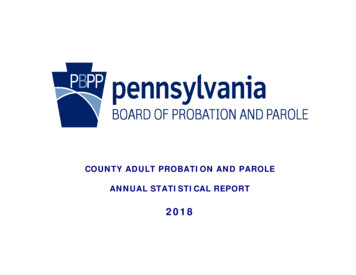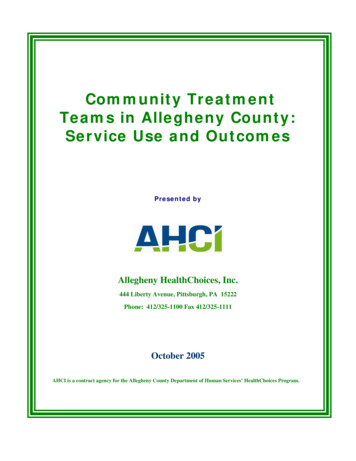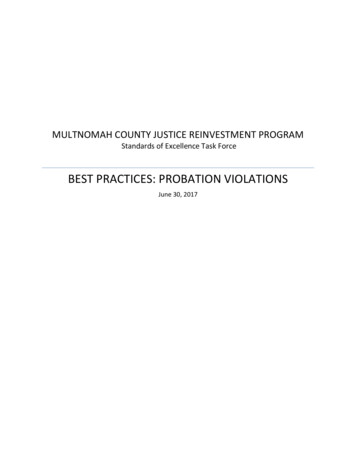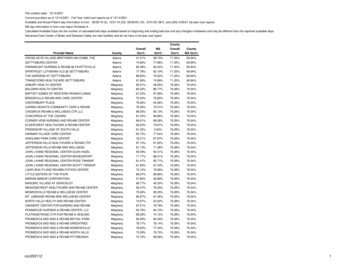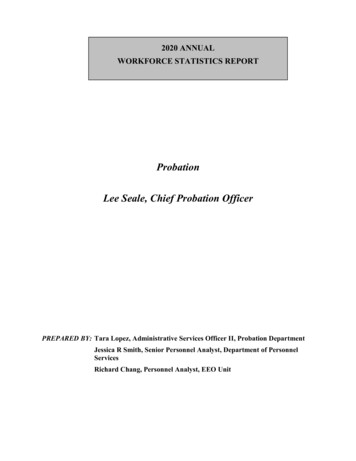
Transcription
ALLEGHENY COUNTYADULT PROBATION2016Fifth Judicial District of PennsylvaniaAnnual ReportAllegheny County Adult Proba on & Parole ǁ 2016 Annual Report
MISSION STATEMENTAllegheny County Adult Probation and Parole is charged by theCourt of Common Pleas with the responsibility of providing effectivecommunity-based alternatives to incarceration, improving public safety,partnering with community and law enforcement resources andpromoting positive behavioral change from offenders.THE PRINCIPLES SUPPORTING ADULT PROBATION AND PAROLE’S MISSION:Through individual assessment, direction andassistance, most offenders can and will becomecontributing members of our community.That offenders can and will be held accountablefor the harm they cause to individuals as well as tothe community at large.Recognizing our responsibility for public safety, acomprehensive system of community corrections,including incarceration and reentry, will bedeveloped and supported.The strengths and resources of our community arevital to the success of our offenders.That excellence in the quality of court servicesrequires sensitivity to racial, ethnic, and culturaldiversity.2Allegheny County Adult Proba on & Parole ǁ 2016 Annual Report
Mission Statement2Administra on4Director’s Report, Frank J. Scherer5Message from Alan F. Pelton, Deputy Director6Adult Proba on Department Overview7Highlights and Accomplishments10Evidence‐Based Prac ces13Problem Solving Courts15Presenta ons18Alterna ves to Jail19Community Resource Centers21Staff Development23Community Partners24Community Par cipa on25New Employees26Promo ons and Re rees28Adult Proba on History29Adult Proba on Organiza onal Chart30Allegheny County Adult Proba on & Parole ǁ 2016 Annual ReportTABLE OF CONTENTSAllegheny County Adult Probation & Parole3
Fi h Judicial District of PennsylvaniaCourt Administra onHonorable Jeffrey A. ManningHonorable David R. CashmanPresident JudgeAdministrative JudgeLinda L. Kelly, EsquireThomas M. McCaffreyDistrict Court AdministratorCriminal Court AdministratorClaire C. Capristo, EsquireDistrict Court AdministratorRetired February 20164Allegheny County Adult Proba on & Parole ǁ 2016 Annual Report
Director’s MessageIam pleased to present the 2016 Allegheny County AdultProbation Department’s annual report. This past year emphasized ashift in our approach to supervision with a reduction in caseloadnumbers so that probation officers could better utilize corecorrectional practices. The average caseload size for officerssupervising medium-risk offenders decreased by 18 percent and by21 percent for officers supervising high-risk offenders. The result oflower caseload numbers equates to an increase in the quantity andquality of interactions between probation officers and those theysupervise.We continued to work on our Smart Supervision Grant, awardedfrom the Bureau of Justice Assistance in 2015. This project aims toAPDstrengthen supervision practices and improve outcomes through (1)Frank J. Schererexpanded staff training on evidence-based practices (EBP); (2)adoption of dosage-based supervision practices and metrics; and (3) design and use of an interactivedashboard for our mobile workforce that supports quality assurance and fidelity to EBPs in real-time.As an integral part of the grant, we continued our work with The Carey Group, nationally recognizedexperts in the field of evidence-based practices, to train all staff on the four core competencies. Thisincludes building professional alliance, skill practice, case planning, and rewards and responses tononcompliance. In addition, all staff received a refresher course on the fundamentals of EBP andmotivational interviewing. The Carey team will provide further training to the agency throughout2017.We have already begun to work on our 2017 goals, including, but not limited to:Opening a fourth community resource center in the northern region of Allegheny County;Providing court reminders for hearings in order to reduce the failure to appear rate;Exploring models to improve restitution compliance to better serve victims; andImplementing a COMPSTAT process to standardize operations agency wide.I wish to thank President Judge Jeffrey A. Manning, Administrative Judge David R. Cashman, DistrictCourt Administrator Linda L. Kelly, Esq., and Criminal Court Administrator Thomas M. McCaffreyfor their continued support and guidance.In conclusion, I want to recognize all of our staff for their dedication and hard work.Frank J. SchererAllegheny County Adult Proba on & Parole ǁ 2016 Annual Report5
Deputy Director’s MessageAs noted in Director Scherer’s message, the Allegheny County AdultAPDProbation Department (Adult Probation) witnessed many changes in theDstructure of its operations in 2016, all of which were aligned toAlan F. Peltoncompliment the department’s evidence-based practice initiatives. As theuse of proven research and scientific data to drive informed decisionmaking has expanded into the field of community corrections, Adult Probation has dedicated itself tobecoming a leader in the field. Adult Probation has long been a leader in the problem solving courtarena, and we hope to build upon the successes of such courts and improve offender outcomesthroughout the department.Such comprehensive change in a criminal justice agency can be challenging and time consuming, andin October of 2015, we began a three-year process of evidence-based training and implementation ofevidence-based practices. While Adult Probation administrators can amend policies and practices toreflect the new direction of the department, successful implementation cannot be a top down affair, butmust rather come from within the ranks of the department. Fortunately, Adult Probation has a dedicatedworkforce willing to engage in the hard work necessary to effect change. Staff members fromthroughout the department have volunteered their time and energy to become certified as evidencebased trainers, cognitive behavior therapy facilitators, risk and needs assessment experts, firearmsinstructors, and self-defense trainers, and the department owes them a debt of gratitude for their effortsto educate, coach, and motivate their co-workers.Many of the department’s evidence-based training goals were met in 2016, and these efforts willcontinue in 2017 and beyond. Additionally, Adult Probation will continue to adopt new evidence-basedstrategies aimed to improve outcomes and new technologies that allow staff to conduct their work moreefficiently and effectively.Alan F. Pelton6Allegheny County Adult Proba on & Parole ǁ 2016 Annual Report
Adult Probation OverviewThe Allegheny County Adult Probation Department(Adult Probation), in conjunction with the Departmentof Pretrial Services, supervises people sentenced tocounty probation or parole for the Fifth Judicial Districtof Pennsylvania. These agencies employ 133 probationofficers for this task. Pretrial Services supervises allpeople under bail supervision or participating in theAccelerated Rehabilitative Disposition Program (ARD)and Ignition Interlock, while Adult Probation isresponsible for all probation, parole, and intermediatepunishment supervision in the county.At the end of 2016, there were 26,549 people undercounty supervision. Seventy percent (18,521) weresupervised under probation and eight percent (2,072)were supervised under parole, intermediate punishmentor probation without verdict. The remaining 22 percentwere supervised by Pretrial Services under the ARDprogram or bail. Fifty-three percent (13,952) of peoplesupervised had a misdemeanor as their highest charge.See Table 1 on page nine for a breakdown of people bysupervision type.Adult Probation continues to supervise individualsbased on their risk to re-offend utilizing the Level ofService Inventory-Revised (LSI-R) to createsupervision plans that targettheir needs. In 2016, AdultProbation worked to reducecaseloads so that probationofficers could better utilizecore correctional practices.To this end, Adult Probationmerged probation officersfrom the former High ImpactUnit into the department’sfive community-based fieldoffices. As a result, averagecaseloads for medium- andhigh-risk people decreasedby 18 percent (from 100 to82) and 21 percent (from 106to 84) respectively. Thisdecrease in caseload sizeallowed for an increase inthe quantity and quality ofinteractions betweenprobation officers and thosethey supervise.Adult Probation continued to operate three communityresource centers (CRCs) throughout Allegheny Countythat support Adult Probation’s model of supervision byproviding a ‘one-stop shop’ for social services to meetthe needs identified in the LSI-R (see Figure 1 for CRClocations). All three centers are located on publictransportation routes allowing people to more easilyaccess the services that they need to improve outcomesand reduce recidivism. Each of the CRCs house socialservices targeting medium- and high-risk peopleincluding, employment assistance, adult education andGED preparation, drug and alcohol testing andassessment, cognitive behavioral therapy (CBT) groups,batterers’ intervention programs (BIP), and emergencyhousing assistance. Probation officers refer offenders tothe CRCs to address the risks and needs identified in theLSI-R and to fulfill any other court ordered stipulations.Services are paid for by the Allegheny CountyDepartment of Human Services, which utilizesperformance based contracting and monitoring to ensurethat all providers use evidence-based practices.Figure 1: CRC Locations in Allegheny County, 2016Allegheny County Adult Proba on & Parole ǁ 2016 Annual Report7
Adult Probation OverviewAdult Probation continued to operate its SmartAccountability project funded through a SmartSupervision grant from the Bureau of Justice Assistance(awarded in 2015). The project, in partnership with theUrban Institute, aims to develop performancebenchmarks for supervision, implement ‘dosageprobation’ supervision based on risk and needs, providereal-time information on performance benchmarks toprobation officers and their supervisors via dashboards,and improve the quality of all interactions through aconcurrent three-year evidence-based practice trainingregimen. In 2016, all staff received training onevidence-based practices, motivational interviewing,and core correctional practices. In addition, AdultProbation improved its case management system tobetter capture dosage information, created workgroupsto design the initial dashboards for probation officersand supervisors, and initiated a pilot caseload reductionproject. (See the Highlights & Accomplishment sectionfor more details).Adult Probation also provides supervision throughspecialized units based on specific sentence conditionsor identified needs. This includes operation of theelectronic monitoring program for those sentenced tointermediate punishment and supervision of peopleinvolved in one of Allegheny County’s seven problemsolving courts. At the end of 2016, there were 1,071people participating in a problem solving court.Throughout the year, 465 people entered and 435 exitedone of the problem solving courts, and of those exiting,73 percent graduated successfully.In 2016, Adult Probation created dedicated units ofofficers for domestic violence court and for the reentryprogram. By consolidating these specially trainedofficers into dedicated units with one supervisor, theyare better able to collaborate and learn from oneanother. Previously, these officers were geographicallyassigned to one of the department’s five communitybased field offices.In 2016, in addition to providing direct supervision, Adult Probation also: Completed 610 presentence investigative reports for the court; Conducted 3,679 Gagnon I hearings for alleged probation violators in the AlleghenyCounty Jail three days per week and in the courthouse one day per week; Presented 2,211 Gagnon II probation violation hearings before the court through the CourtLiaison Unit; Continued partnerships with local and national groups, including the Urban Institute, theCenter for Court Innovation, the National Center for State Courts, and the Institute ofPolitics at the University of Pittsburgh; Presented at national and state conferences, including the American Probation and ParoleAssociation, the National Association for Court Management, the PennsylvaniaAssociation on Probation, Parole and Corrections, the Pennsylvania Drug and DUI Courtconferences, and the roundtable on procedural justice in New York; Served more than 2,900 people at one of our three community resource centers by helpingto address key risks and needs to prevent future crime; Conducted EBP 101 and introductory motivational interview training for all staff; and Conducted monthly detainer review meetings with all criminal court judges to ensurepeople are not detained longer than necessary.8Allegheny County Adult Proba on & Parole ǁ 2016 Annual Report
SUCCESSFUL SUPERVISIONTable 1: PEOPLE SUPERVISED ON 12/31/2016ProbationParoleIntermediate PunishmentAccelerated Rehabilitative Disposition(ARD)Probation without ENDERS UNDER SUPERVISION BYOFFENSE S UNDER SUPERVISION BY RACEFigure 2: Percentage of People SuccessfullyCompleting Supervision in 2016, by Risk CASELOAD PER PROBATION OFFICERField Offices – High-Risk84Field Offices – Medium-Risk82Low-Risk Unit1,111Electronic Monitoring42DUI (Driving Under the Influence) Unit145Restitution Unit385Sex Offender Unit74Domestic Violence Unit86Mental Health Unit38Reentry Unit87Inter-State509Inter-County Unit511State3,769Bail Unit334Allegheny County Adult Proba on & Parole ǁ 2016 Annual Report9Adult Probation OverviewAdult Probation uses multiple metrics to measuresupervision success, including in-program rearrests,revocations of supervision, improvements in identified areas(e.g., increases in education levels, obtaining employment,and completion of substance abuse treatment, reduction incriminal thinking and behaviors, and improvements in prosocial behavior). The measure of supervision successpresented in Figure 2 looks at the percentage of peoplecompleting supervision without a new conviction orrevocation based on a technical violation. In 2016, 10,171people completed supervision – 87 percent of low-riskpeople were successful compared to 82 percent of mediumrisk and 77 percent of high-risk people.
Highlights & AccomplishmentsGR A N TFU N D E DPR O J E C T SMENTAL HEALTH COURT STRATEGIC PLANNING INITIATIVEHighlights & AccomplishmentsIn 2015, Allegheny County’s Mental Health Court (MHC) wasawarded a two-year grant from the Bureau of Justice Assistance(BJA). The project includes a process and outcome evaluation ofthe court that will be used to guide a strategic planning processwith the MHC team. Allegheny County is partnering with theCenter for Court Innovation on this project. This year, the Centerfor Court Innovation conducted initial interviews, issued a broadstakeholder survey, and conducted a site visit in June 2016 tospeak with team members and observe court proceedings. Inaddition, they presented initial process evaluation findings to theteam. The final evaluation and strategic planning process will beconducted in 2017.L‐R: M. DeSan s, D. Barnisin, G. Siroky, T. DuckeSeated: The Honorable Beth A. LazzaraSEX OFFENDER COURT BEST PRACTICES TRAININGAllegheny County’s Sex Offender Court (SOC) received aBJA funded grant for the Center for Sex OffenderManagement (CSOM) to provide training to key SOCstakeholders. This included a court observation in April2016 and a full day of training for more than 50 peopleinvolved in sex offender supervision. The presentersincluded Rebecca Thomforde Hauser from the Center forCourt Innovation, Dr. Kurt Bumby of CSOM, and GregBrown of the Boulder, Colorado Probation Department.Through court observation, these experts were able totailor the training session to key areas for the court toimprove. This included standardization of treatmentservices, use of multiple types of validated risk and needsassessment tools, and introduction of policies andprocedures to address secondary trauma for those workingwith this population. As a result, the SOC team appliedfor and received funding to train on conducting sexoffender specific assessments.NATIONAL CENTER FOR STATE COURT SUPERVISOR WORKLOAD ANALYSISIn 2016, Adult Probation was awarded a technicalassistance grant from the State Justice Institute for theNational Center for State Courts to conduct a workloadassessment for our supervisors. The National Center forState Courts will assist in identifying the key roles,responsibilities and tasks of supervisors in an agency thathas fully implemented evidence-based practices (EBP)10with fidelity. This project can help transition the roles ofsupervisors to become experts in EBPs so they can mentorand coach probation officers in their effective use. Thiscoaching is crucial for implementing EBPs with fidelityand, ultimately, to reducing recidivism, improvingoutcomes for people under supervision, and improvingpublic safety.Allegheny County Adult Proba on & Parole ǁ 2016 Annual Report
PROCEDURAL JUSTICE IN COMMUNITY SUPERVISIONAdult Probation participated in a procedural justiceassessment of criminal court, conducted by the Center forCourt Innovation. Through this process, Adult Probationidentified a need for additional training in best practicesaround procedural justice in community supervision.Adult Probation was awarded a technical assistance grantfrom the Center for Court Innovation (funded by theBureau of Justice Assistance) to create a "practical tips"planning session in early 2017 to generate promisingpractices and to help develop a stand-alone proceduraljustice curriculum for community corrections.SMART ACCOUNTABILITY PROJECTinteractive dashboards for our mobile workforce thatsupports quality assurance and fidelity to EBPs in realtime. Adult Probation is partnering with the UrbanInstitute to assess efforts to implement a data-driven,dosage-based supervision model using an action researchframework that provides regular, actionable feedback.NATIONAL INSTITUTE OF CORRECTIONS THINKING FOR CHANGE (T4C) TRAININGIn July 2016, Adult Probation was able to send two staffmembers, Community Monitor Hakim Fontaine andProbation Officer Latoya Brownfield, to the NationalInstitute for Corrections to be trained as Thinking forChange (T4C) facilitators. Thinking for Change is a seriesof classes that educate people under supervision on toolsand techniques they can use to resolve conflicts in a prosocial manner.IN I T I A T I V E ST ORE D U C EThe T4C curriculum offers students the chance to roleplay various scenarios related to conflict resolution andreceive feedback, coaching, and instruction fromfacilitators. Providing those under supervision with thesecritical thinking exercises and pro-social alternatives toconflict resolution will enable them to focus on positivebehavioral change and complete their communitysupervision successfully.TH EJA I LPO P U L A T I O NDETAINER REVIEW PROCESS AND OUTCOMESBeginning in September 2015, Adult Probation hasworked with the court to reduce unnecessary jail detentiondays. This includes reducing the number of detainersissued, when appropriate, and reducing the number ofdays a person is detained. This is particularly true forpeople detained for technical violations of theirsupervision. Since then, the number of detainers issuedhas decreased by 14 percent, resulting in 427 fewerincidents of detention. In addition, between 2015 and2016, the median days detained decreased by 13 percent(11 days). This can be attributed to the decrease in thenumber of days a person is detained for technicalviolations.Allegheny County Adult Proba on & Parole ǁ 2016 Annual Report11Highlights & AccomplishmentsAdult Probation was awarded a Smart Supervision grantfrom the Bureau of Justice Assistance in 2015 to createits Smart Accountability project. This project aims tostrengthen supervision practices and improve outcomesthrough (1) expanded staff training on evidence-basedpractices; (2) adoption of dosage-based supervisionpractices and metrics; and (3) design and use of
DIVERSIONIn 2016, Adult Probation continued its collaborativeefforts with the Allegheny County Department of HumanServices (DHS) and the Allegheny County Jail (ACJ) toreduce the jail population by diverting eligible people inneed of drug and alcohol treatment from the ACJ totreatment programs. The diversion program is offered toany person in the ACJ who has a case in the Fifth JudicialDistrict and is in need of drug and alcohol treatment.Adult Probation makes referrals to the diversion programat the Gagnon I violation hearing for those detained in theACJ. Referred people are assessed within three to fourbusiness days to determine the necessary level oftreatment and subsequently transferred to an approvedtreatment facility.In 2016, 527 people were referred to the diversionprogram, an increase of 123 percent from 2015. Eightyone percent of those placed into inpatient treatmentresulted in successful completion of treatment.The overall increase in referrals can be attributed toincreased awareness of the program throughout the Courtof Common Pleas, the expansion of service referrals atthe pretrial level of confinement, and the expansion ofservices for inmates detained on probation violations.COUNTY-WIDE TASK FORCEHighlights & AccomplishmentsIn 2016, key stakeholders in Allegheny County, includingkey criminal justice leaders, worked on reducing the jailpopulation and identifying alternatives to jail whenappropriate. A criminal justice task force was created atthe behest of Allegheny County Executive RichFitzgerald. This task force was spearheaded by theInstitute of Politics at the University of Pittsburgh andincluded participation from local criminal justice leaders,including the director of Adult Probation, localresearchers from the University of Pittsburgh andCarnegie Mellon University, and the foundationcommunity. The recommendations of this task forceincluded reducing the length of probation terms tocoincide with national standards, eliminating the use ofconsecutive probation terms, and the use of fair, swift, andcertain sanctions for probation violations.CHILDLINEPer the Child Protective Services Law (Act 15 of 2015) probation officers are mandated reporters of suspected oralleged child abuse. As mandated reporters, probation officers, including supervisors, managers, and administratorsmust complete the required Recognizing Child Abuse and Mandated Reporter training and obtain the followingclearances:Fingerprint based Federal Bureau ofInvestigation criminal history report.Pennsylvania State Police criminal historyreport.Pennsylvania Department of HumanServices child abuse history report.Clearances shall be resubmitted every three years andthe Recognizing Child Abuse and Mandated Reportertraining shall be completed every five years.Proba on Officer Roman Shablesky is pictured complying withChildLine’s fingerprin ng guidelines.12Allegheny County Adult Proba on & Parole ǁ 2016 Annual Report
EV I D E N C E- BA S E DPR A C T I C E SIMPLEMENTING EVIDENCE-BASED PRACTICESIn addition to training, Adult Probation conducted areview of all current policies with the goal of removingsome, editing others, and adding any other necessarypolicies to support the current direction of the agency.This included an overhaul of the early termination policyto increase the number of compliant people consideredfor an early end to their supervision, a concerted effort offield officers to identify people who might be moved tolower levels of supervision, and rewriting case contactpolicies to include dosage and quality, rather than merelycounting contacts.In 2016, Adult Probation also worked to realign itsoffices to more effectively supervise people in thecommunity. As a result, probation officers assigned tothe former High Impact Unit were assigned to each of thefive regional field offices where they will continue tosupervise high-risk people. These field offices aregeographically based and, prior to the realignment,supervised medium-risk people. This restructuringallowed officers supervising medium- and high-riskpeople to more closely collaborate by geographic areaand help create standards around casework and bestpractices. As part of this process, Adult Probation alsocombined specialized probation officers into two unitswith dedicated supervisors. This includes a Reentry Unit,comprised of five regionally assigned probation officersand a Domestic Violence Unit (DV). The five officer DVUnit supervises repeat domestic violence offenders.REENTRY PROGRAMAdult Probation continued operation of its evidencebased reentry program, now in its seventh year. In 2016,Adult Probation created a Reentry Unit with onededicated supervisor. Prior to 2016, these officers wereeach based out of one of the agency’s five regional fieldcenters, with five different supervisors. By creating onespecialized unit, the new supervisor can ensure thatofficers are implementing evidence-based practices withfidelity and consistency, which helps to improve overalloutcomes for those reentering local communities.Reentry Unit officers begin interacting with programparticipants while they are still serving their jail sentence.Probation officers in the Reentry Unit work closely withjail reentry specialists to assess each person and createindividual service plans to address his or her needs.Program participants then engage in programming toaddress those needs during their confinement. Sixty daysprior to release, the reentry team meets with the offenderto re-assess and update the service plan, which includescreating a transition plan into the community. Reentryprobation officers continue to supervise offenders as theytransition back into their communities and help ensurethey are adhering to their service plan and meeting courtordered stipulations.Due to a decline in the number of people sentenced to theAllegheny County Jail, the reentry program is expandingto include high-risk people who are detained by AdultProbation. These people will receive the same servicesand support as sentenced reentry participants. Enrollmentin this program will begin in January 2017.Allegheny County Adult Proba on & Parole ǁ 2016 Annual Report13Evidence-Based PracticesAdult Probation is working to improve fidelity toevidence-based practices (EBP) and the outcomes ofthose we supervise. To this end, Adult Probationconducted internal trainings and partnered with nationalleader, The Carey Group, to conduct additional EBPsessions. This included an agency-wide introduction toEBP, an introduction to motivational interviewing, andthe implementation of a train-the-trainer model to instructstaff on the four core competencies of evidence-basedsupervision.
PILOT CASELOAD REDUCTION PROJECTIn June 2016, Allegheny County Adult Probation began athree month pilot project of reduced caseloads for fieldofficers supervising medium- and high-risk people. Withthe caseload reduction, officers are better able toadminister EBP and work with people under supervisionto change behavior and more quickly address violations.Ten medium-risk and five high-risk officers reduced theircaseloads to 75 and 65 respectively, a decrease of 34percent. This translates to an average of 36 fewer peoplesupervised per officer. With these reduced caseloads,officers were expected to utilize evidence-based bestpractices to supervise based on risk and needs, applyingmotivational interviewing and skill building with thosethey supervise.compliant and could be moved to lower levels ofsupervision to help reduce their caseloads. Theyidentified 445 people initially. The people who weretransferred to lower levels of supervision had lowerrearrest rates than those who remained in the field. Inaddition, rearrests for those that remained supervised inthe field were lower during the pilot period than pre-pilotperiod (see Figure 3). This may be due, in part, toprobation officers having more time to implement theseevidence-based best practices. During this pilot there wasa 25 percent increase in the number of in-person contacts.In addition, most rearrests for those transferred to lowerlevels of supervision were for non-violent, low-levelcrimes. Only 13 percent were for felony violent crimes.Evidence-Based PracticesPreliminary analysis suggests that this process yieldedpositive results. Prior to the pilot, probation officers wereasked to identify people on their caseload who wereFigure 3: Rearrest Rates Pre‐ and Post PilotAs a result of the success of the pilot program, all field centers were required to ‘right-size’ their caseloads toensure those who are the greatest risk to public safety and those with the highest needs are supervised withthe appropriate dosage. In addition, it is important to have manageable caseloads as evidence-based practicesare fully implemented with fidelity. From 2015 to 2016, average caseloads for medium-risk officersdecreased by 18 percent (100 to 82), and high-risk officers saw a 21 percent decrease, from 106 to 84 peoplesupervised.14Allegheny County Adult Proba on & Parole ǁ 2016 Annual Report
Adult Probation Problem Solving CourtsAs of December 31, 2016, there were 1,071 peopleparticipating in one of the county’s seven problem solvingcourts. There are four treatment courts (Drug Court, DUICourt, Mental Health Court, and Veterans Court), twodocket driven compliance courts (Sex Offender Court andDomestic Violence Court) and Pride Court, a court aimedat assisting people convicted of prostitution charges. Allcourts strive to follow evidence-based best practices, andthe treatment courts adhere to the 10 key components ofdrug courts and the National Association of Drug CourtProfessionals (NADCP) best practice stan
Allegheny County Adult Proba . and Ignition Interlock, while Adult Probation is responsible for all probation, parole, and intermediate punishment supervision in the county. At the end of 2016, there were 26,549 people under county supervision. Seventy percent (18,521) were
